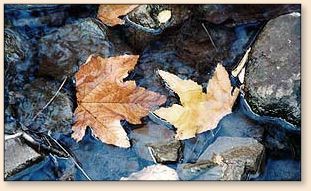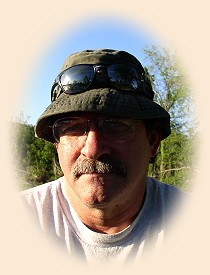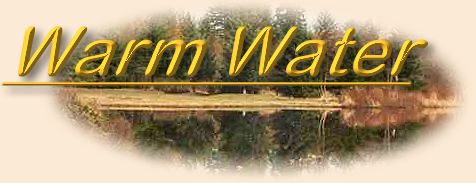|
The good thing about taking a weeklong
vacation is that you can forget what it's
like to be at work. The bad thing is when
an avalanche of work buries you up to your
eyeballs the second you come back home.
I had just returned from a 41-mile wilderness
style canoe camping trip on Minnesota's Root River.
Michelle, one of the secretaries in my office, said
"Hi" as I walked in the door. What she should have
done instead was offer me a blindfold and a cigarette;
for the next nine work days I don't think I've ever
been busier or under more stress. It got so hairy
that for two straight weekends I lacked the physical
energy or even the will to go fishing - I basically
crawled out of bed Saturday and Sunday mornings,
made my way downstairs to the recliner chair and
laid there like a puppy hit by a truck.
On the third Saturday of this avalanche, instinct
told me that I had to either force myself back
into recreation mode or I'd become yet another
white collar burnout. I racked my canoe and
began loading my pickup with fishing gear.
The exercise felt like one of those out-of-body
experiences, like I was watching somebody going
through the motions of preparing for a fishing
trip. I was distracted anyway, because I had
a band gig to play that evening and I wasn't
really psyched for it, either.
But what was messing with my mind more than
anything was I'd been loading and unloading
canoe and camping gear after the Root River
trip, shifting equipment around in my garage,
putting some stuff back into my truck, taking
other stuff out, sorta like an old dog circling
around figuring out where to lay down. Eventually
I corralled my fly tackle, backed out of the
driveway, bought some ice for my cooler and
headed for the lake. Free at last.
The lake was devoid of fishermen, illustrating
once again the primary social value of the game
of football: come Saturdays and Sundays in the
fall, the majority of today's outdoorsmen stay
home or go into stadiums to watch NCAA or NFL
games. Bless their hearts! It was now almost
11 a.m. and I had the entire lake to myself -
195 acres, mine, all mine. The very sight of
it brought the strength surging back into my bones.
I unracked my canoe, set it down by the water's
edge then took my two anchors out of the bed of
my pickup. Next out were my foam paddling saddle
and ankle blocks, then my fly tackle bag. I
clipped my curved forceps onto a shirt pocket
flap, put my line clipper lanyard around my neck,
assembled my 2-piece fly rod, grabbed my PFD and
walked around the back of my pickup toward the
canoe.
Looking down at my canoe and the various gear
arrayed before me, I froze; something didn't
look quite right. Then it hit me: I would
definitely have better luck propelling myself
across the surface of the lake if I had a canoe
paddle? There was no need to turn around and
look inside my truck for it; I knew I'd left
it in my garage. Well, isn't this just great?
What do I do now?
Driving back for the paddle was out; the band
gig I was scheduled to play starts in just five
hours. The time I would blow on a trip home,
then back to the lake, then back home again
would knock out my fishing time for today.
The choice was brutally simple: either fish
from the bank (gag me with a spoon) or go home
without wetting a line, then try to survive
another whole week of work hell before another
chance comes to go fishing.
You'd have to see this lake to appreciate the
depth of my unhappiness. Where the lakeshore
is open enough for classic fly casting the water
tends to be too shallow, too weed-choked, or too
windswept. The places where good water lays
close against the shore, the adjacent bank is
densely grown with trees, shrubs, tall weeds
and...poison ivy. Fly fishers afoot here are
hard against it, I kid you not.
The only shred of good luck still in my corner
was that I'd come to a spot in a main cove where
a narrow feeder creek enters the lake. This creek
flows underneath a county road bridge that was
sitting only 150 feet from where I'd parked. A
nice hole lies under the bridge, one that's deep
enough and long enough to harbor fish. (This is
the same bridge mentioned in one of my earlier
stories, "What shouldn't have happened, did".)
Tippy-toeing to the brink of the vertical creek
bank, I could look almost straight down into tail
end of the hole. I didn't see anything moving
in the water, not even a minnow. Probably the
recent cold front had sent the fish deep. The
creek surface was heavily coated with Sycamore
leaves. To my immediate right stood a metal road
sign pole stout enough to shatter my graphite rod
if I lost track of my backcast. And to my immediate
left, tree branches would snag my fly and/or fracture
my rod tip if I made a clumsy move that direction.
So...straight ahead we go.
Into the hole went "Old Reliable," a #10 flashback
Hare's Ear nymph. Fifteen minutes later a tiny
bluegill, first fish of the day, grabbed the nymph.
I wondered if my lack of action was due to difficulties
getting my nymph down through the water column.
After all, I was standing very high above the
water surface and this elevated position caused
my heavy floating line to sag immediately following
each cast, which had the effect of jerking the fly
rapidly toward me the instant it hit the water.
Not necessarily a bad thing, except that the fly
was getting pulled through a flotilla of Sycamore
leaves. Ah, Sycamore leaves. If you've never had
the pleasure, please allow me to describe.

Picture a swimming pool whose surface is covered
almost entirely with Styrofoam salad plates. 75%
of your casts drop your fly directly onto one of
these salad plates, or barely miss it. This means
your fly either snags the leaf (forcing you to reel
it in, wasting the cast and spooking fish) or else
the huge leaf fails to flip over and release your
tippet that is laying across it (not allowing the
fly to settle into the water column). Under these
circumstances, one can only hope that any panfish
lurking below possesses an extremely well-developed
sense of humor, because after just a few casts yours
will resemble burnt toast.
Well, there's always more than one way to suffer
when fly fishing from the bank, right? After 30
minutes of futility at my feeder creek overlook,
I quit that spot and walked to the upstream side
of the road bridge. Sneaking down the bank, I
inspected the leading edge of the under-bridge
hole. The water here looked pretty good except
for the leaf cover directly under the bridge;
the counter-current wind made the leaf blanket
denser here than at the tail end of the pool.
Equally annoying, this new spot offered precious
little room for backcasts, either vertically or
horizontally. Also, the bank slope forced me to
stand very close to the bridge. Great care had
to be taken not to actually strike the concrete
structure with my rod tip. And last but not least,
the air space close behind was menaced by low-hanging
tree branches that could easily whack my rod tip
and/or snag my line.
My kingdom for a canoe paddle...
A thought suddenly came to me: my cell phone was
in my truck, plugged into its cigarette lighter
power adaptor. If I walked back there right now
and called Mike, my Field Office Director, he might
take pity and order me to report to the Federal
Building for some kind of Sunday emergency overtime
task that would spring me from this bank fishing
torture chamber.
"Oh, just shut up and make a roll cast, will ya?"
I scolded my whining self.
"Okay," I answered myself, "but if I break my rod
tip on this bridge, it's YOUR FAULT!"
"Agreed; I'll pay for any damages," I replied to
myself. And then with great clumsiness I made a
rod-horizontal backhand sidearm roll cast that
transported my Hare's Ear about halfway back
into the bridge's deep shadow. Miraculously,
the nymph landed between two massive Sycamore
leaves, and the leader even settled onto the
surface in a narrow open lane between some
other leaves. The nymph began drifting toward
the bottom and...WHAM!...a bluegill hammered it
like this was the first prey item he'd seen in
six weeks. It wasn't a big bluegill, barely 5
inches long, and that was fine by me. Better
small than not at all.
In the next hour I pulled four more 'gills out
from under the bridge, the biggest packing so
little body weight that Rick Zieger himself
would have proudly taken it home to photograph
it for a visual counterbalance to all the monster
'gills he normally catches.
After the bridge hole played out (which happened
long before I quit fishing it), I decided to try
one last spot -- another cove that offers limited
shore casting possibilities. Fortunately for me,
I selected a little-used lake perimeter road to
reach the spot. I say fortunate, because while
rolling down that old road at low speed I began
hearing strange rattling noises in my truck.
Curious as to what was causing it, I stopped to
see if something was rolling around loose in the
bed. Nothing. Then I glanced up and discovered
that - gasp! -- I'd forgotten to put the tiedown
straps around my canoe after I'd racked it. Had
I chosen the smoother, faster road instead of this
bumpy slow one, by now wind resistance would have
torn my canoe clean off my rack, possibly flipping
it through the windshield of an oncoming vehicle.
Hyperventilating only slightly despite my pounding
heart and trembling hands, I strapped down my canoe
and proceeded to the next cove, where after 45 minutes
of flailing away I caught not a single fish and
attracted nary a touch. Time now, finally, to
raise my hands and surrender.
This trip only goes to show that fly fishing
can turn ugly real fast when your body is in
Kansas, your short-term memory is trapped in
Minnesota, and your forward vision is focused
more on an imminent music gig. I like to think
my luck would have been different had I been
able to paddle out to the brush filled, 5-ft
deep water I intended to work. I'll never know
the answer, because instead of fishing open water
I sent myself up a creek without a paddle. ~ Joe riverat@sunflower.com
About Joe:
 From Lawrence, Kansas, Joe is a former municipal and
federal police officer. In addition to fishing, he hunts
upland birds and waterfowl, and for the last 15 years
has pursued the sport of solo canoeing. On the nearby
Kansas River he has now logged nearly 5,000 river miles
while doing some 400 wilderness style canoe camping
trips. A musician/singer/songwriter as well, Joe's
'day job' is with the U.S. General Services Adminstration.
From Lawrence, Kansas, Joe is a former municipal and
federal police officer. In addition to fishing, he hunts
upland birds and waterfowl, and for the last 15 years
has pursued the sport of solo canoeing. On the nearby
Kansas River he has now logged nearly 5,000 river miles
while doing some 400 wilderness style canoe camping
trips. A musician/singer/songwriter as well, Joe's
'day job' is with the U.S. General Services Adminstration.
Joe at one time was a freelance photojournalist who wrote the
Sunday Outdoors column for his city newspaper. Outdoor
sports, writing and music have never earned him any money,
but remain priceless activities essential to surviving the
'day job.'
|


 From Lawrence, Kansas, Joe is a former municipal and
federal police officer. In addition to fishing, he hunts
upland birds and waterfowl, and for the last 15 years
has pursued the sport of solo canoeing. On the nearby
Kansas River he has now logged nearly 5,000 river miles
while doing some 400 wilderness style canoe camping
trips. A musician/singer/songwriter as well, Joe's
'day job' is with the U.S. General Services Adminstration.
From Lawrence, Kansas, Joe is a former municipal and
federal police officer. In addition to fishing, he hunts
upland birds and waterfowl, and for the last 15 years
has pursued the sport of solo canoeing. On the nearby
Kansas River he has now logged nearly 5,000 river miles
while doing some 400 wilderness style canoe camping
trips. A musician/singer/songwriter as well, Joe's
'day job' is with the U.S. General Services Adminstration.